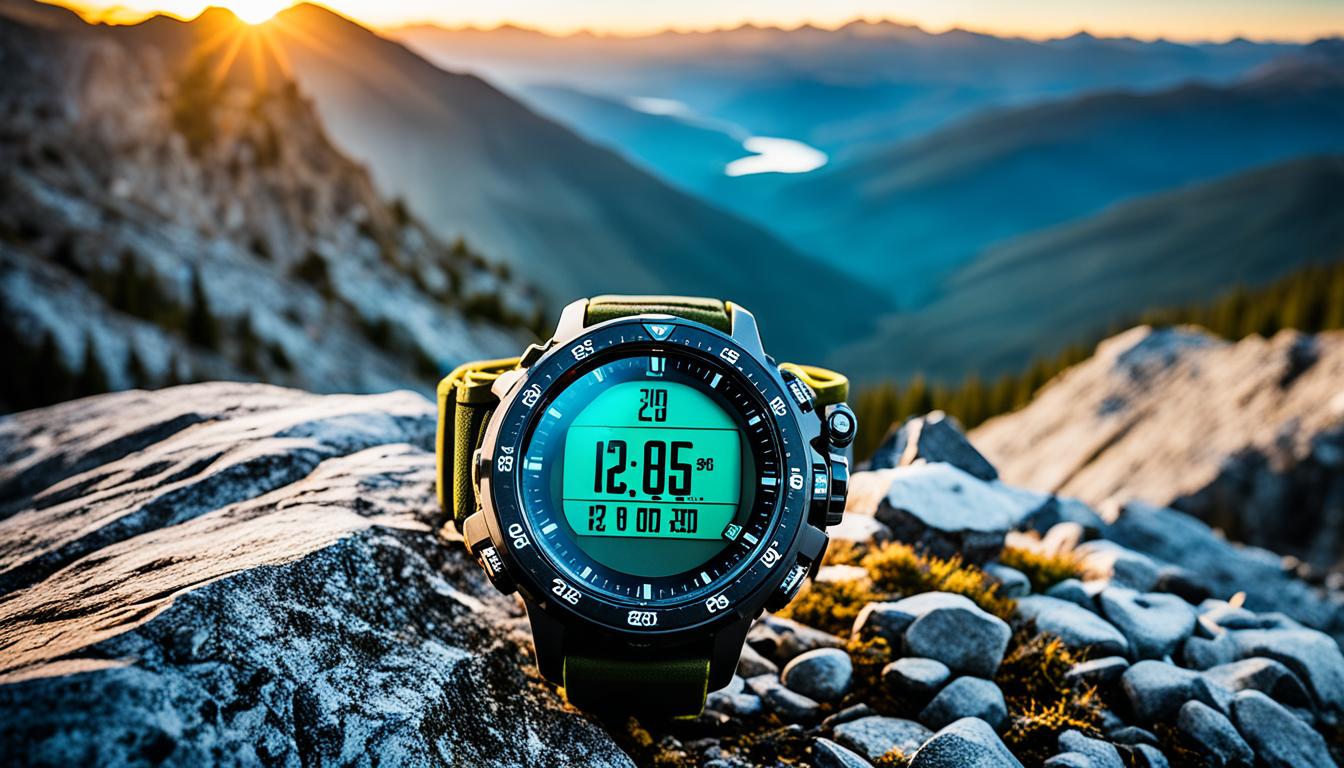Have you ever found yourself lost in the woods with no survival skills? Or have you ever wanted to master the art of living off the land? Primitive skills for survival are essential for anyone who enjoys outdoor adventures.
Whether you’re a camping enthusiast, a hiker, or a survivalist, mastering these skills will equip you with the knowledge and tools to survive in any wilderness scenario. From basic survival skills to crafting tools and weapons using primitive technology, this comprehensive guide will cover everything you need to know to thrive in the great outdoors.
Key Takeaways
- Primitive skills for survival are essential for anyone who enjoys outdoor adventures
- Mastering these skills will equip you with the knowledge and tools to survive in any wilderness scenario
- This guide covers everything you need to know to thrive in the great outdoors, from basic survival skills to crafting tools and weapons using primitive technology
- Investing time in learning these skills can enhance your self-sufficiency, adaptability, and overall readiness for any outdoor expedition
- Start your journey towards wilderness mastery today, with our ultimate guide to mastering primitive skills for survival
Understanding the Importance of Primitive Skills
When it comes to surviving in the wild, outdoor skills and primitive living skills are essential. These skills are not only useful in emergency situations but also in everyday life. By mastering primitive skills, you can enhance your self-sufficiency, adaptability, and overall preparedness for any outdoor expedition.
Primitive living skills encompass a wide range of abilities, including shelter building, firecraft, water procurement, foraging, and hunting. These skills are all about using natural resources and your surroundings to meet your basic needs. When you are equipped with primitive skills, you can survive and even thrive in the wild with minimal equipment or modern tools.
Outdoor skills are also essential for connecting with nature and becoming more self-reliant. In today’s society, we are often disconnected from the natural world and rely heavily on technology to meet our daily needs. By learning primitive skills, you can regain a sense of self-reliance and connection to the natural world.

Building a Strong Foundation: Basic Survival Skills
To become proficient in primitive skills for survival, it’s important to first learn basic survival skills. These skills form the foundation upon which you can build and expand your knowledge of wilderness living.
Fire-Making Techniques
Without fire, survival in the wild becomes significantly more challenging. Learn various fire-making techniques, such as the hand drill and bow drill, to create fire using primitive methods. Practice starting fires in all weather conditions to become proficient in this essential skill.
Emergency Shelter Construction
Whether you’re caught in a sudden storm or stranded in the wilderness, knowing how to construct an emergency shelter can mean the difference between survival and disaster. Learn to construct simple shelters using natural materials, such as debris huts and lean-tos.
Water Procurement
Water procurement is one of the most critical skills for survival. Learn how to locate potential sources of water, such as lakes and rivers, and purify them using primitive methods, including boiling and filtering.
Food Procurement
While it’s possible to survive for a short period without food, eventually you’ll need to procure sustenance. Learn how to identify edible plants and fungi, and practice hunting techniques to acquire protein-rich food sources.
Navigation
Navigation is a crucial skill for survival in any wilderness scenario. Practice using a compass and maps to navigate your surroundings. Learn how to orient yourself and follow a bearing to reach your destination.
By mastering these basic survival skills, you’ll be better equipped to handle any situation in the great outdoors. Consider enrolling in survival training to gain a more comprehensive understanding of these skills and how to apply them in real-life scenarios.
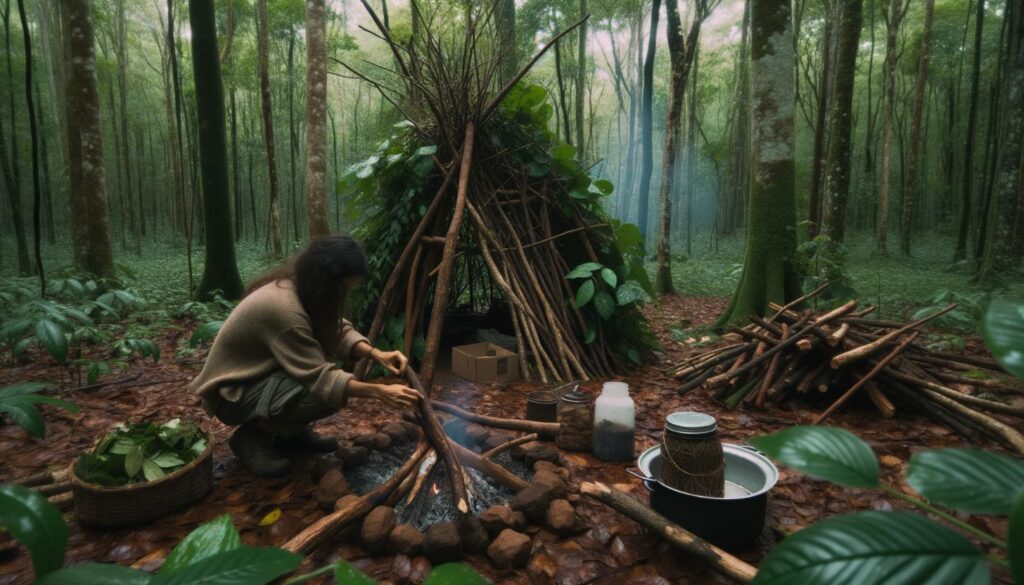
Navigating the Natural Environment: Wilderness Navigation
To navigate the wilderness, you need to learn wilderness survival skills like reading maps, using a compass, and navigating natural features.
Start by learning how to read a topographic map. A topographic map provides an accurate representation of the landscape, including the elevation of mountains, valleys, rivers, and other natural features. Understanding topographic maps is crucial to navigate your way through unfamiliar terrain successfully.
The next step is to learn how to use a compass. A compass helps you determine the direction you are traveling and keeps you on course. You must learn how to orient the map with the compass and understand the difference between magnetic and true north.
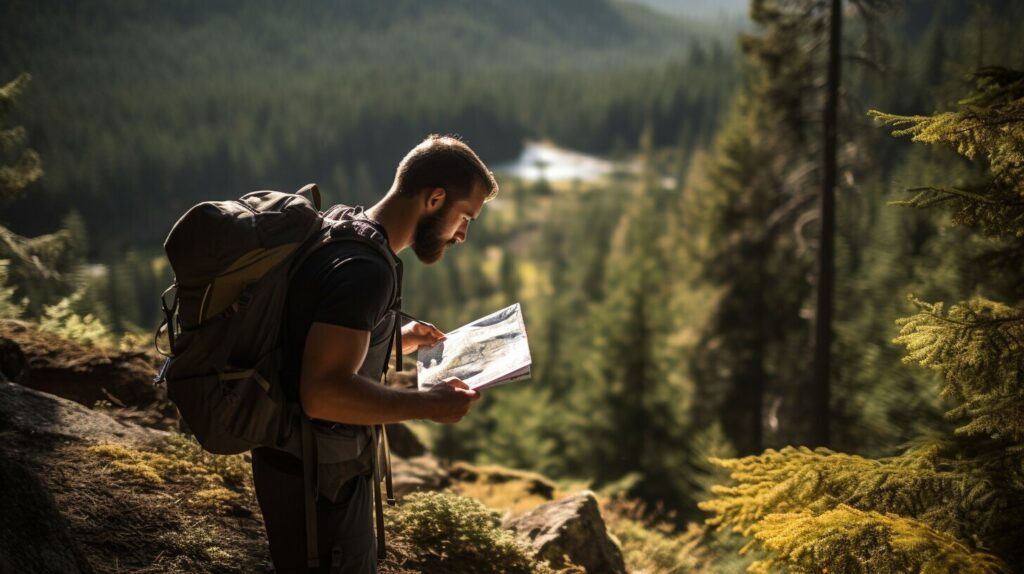
It is also helpful to learn how to navigate using natural features such as the sun, moon, and stars. Knowing how to use these features in conjunction with your compass and map can help you stay on course, even when modern technology fails.
Remember, being able to navigate the wilderness is one of the most critical wilderness survival skills. By mastering wilderness navigation techniques, you can confidently explore the great outdoors while staying safe and on track.
Sourcing and Purifying Water: Water Procurement
Water procurement is a critical primitive skill for survival in the wilderness. You can only survive three days without water, making it essential to know how to source and purify it using primitive technology.
There are several primitive methods to gather water. One of the easiest and fastest ways is to collect rainwater. You can use natural materials like leaves, bark, and animal hides to create a bowl or container to collect the water.
If you do not have access to rainwater, you can also collect water from natural water sources like rivers, streams, and lakes. Make sure to boil the water for at least five minutes or use a water filter to remove impurities and contaminants.

Boiling and filtration are not the only methods to purify water using primitive technology. You can also use a solar still to collect and purify water at the same time. Dig a hole into the ground, place a container in the center, and cover the hole with a plastic sheet. As the sun heats the ground, water vapor will collect on the underside of the plastic sheet and drip into the container.
Another way is to construct a water filter using natural materials like sand, gravel, and charcoal. You can layer these materials in a container and pour water through it to remove impurities.
By understanding the primitive technology of water procurement and purification, you can ensure your hydration needs are met in the wild.
Gathering Food: Foraging and Hunting
When it comes to bushcraft skills, being able to gather food from the wilderness is crucial for survival. Learning how to forage and hunt will provide you with the necessary nutrients to sustain your energy levels and remain healthy in the wild.
Foraging: Foraging involves identifying and gathering edible plants, fungi, and insects found in the wild. Before foraging, it is essential to educate yourself on the different plants and fungi varieties in your area and learn how to identify them correctly. Look for resources such as field guides, local experts, or online resources to familiarize yourself with the eatable wild plants in your area. Be cautious of poisonous plants and know how to differentiate them from the edible ones.
Hunting: Hunting involves pursuing and killing animals for food in the wilderness. Different hunting techniques can be used, depending on the terrain and animal being hunted. Setting traps and snares is an effective method to catch small game. Bow hunting is another common primitive hunting technique that is still used today. Learning how to hunt is a valuable skill that takes time and practice to master.
A successful forager and hunter should understand how to process and cook their food properly. Bushcraft skills such as skinning, gutting, cleaning and cooking the game are essential to ensure that the food is safe to eat. Do not forget to respect nature and avoid overhunting or foraging when you find yourself in the wild.
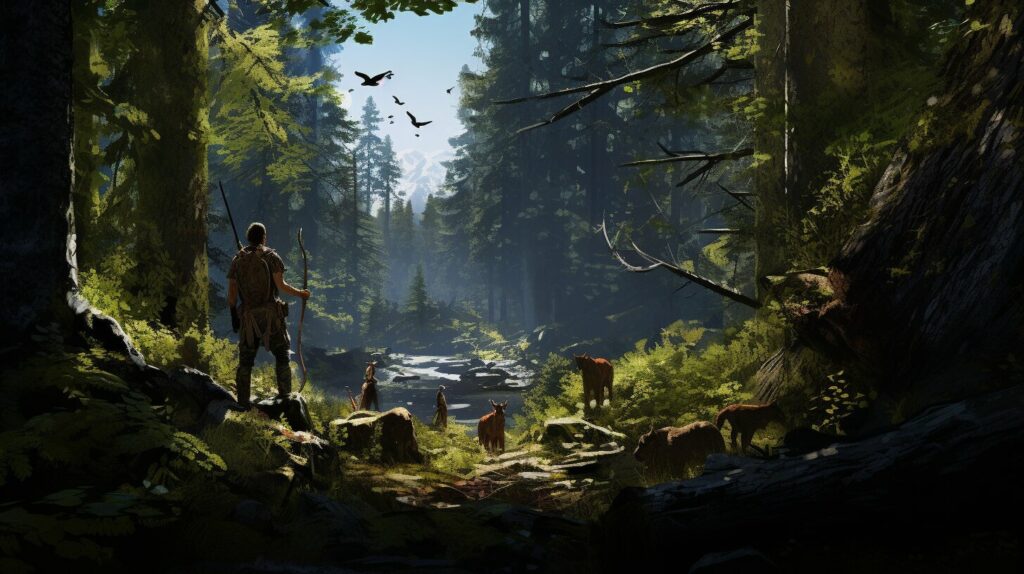
Crafting Tools and Weapons: Primitive Technology
Mastering primitive technology is an essential skill for wilderness survival. You must learn to craft tools and weapons from natural resources found in your environment. With this knowledge and skill, you can improve your chances of survival and self-sufficiency in any wilderness situation.
Primitive technology involves using materials such as stone, bone, and wood to create tools and weapons. With these simple materials, you can make knives, axes, and spearheads that are sharp and durable enough to hunt and defend yourself.
One of the most critical tools you will need in the wilderness is a knife. You can use it to prepare food, build shelter, and craft other tools. You can make a knife by chipping away at a piece of stone until it has a sharp edge. Alternatively, you can make one from bone or antler.
Another essential tool is an axe, which you can use to chop wood for your fire and shelter. You can make an axe by attaching a sharp stone or bone to a sturdy wooden handle.
In addition to tools, weapons are also crucial for survival. You can make a spear by attaching a sharp stone to a sturdy wooden shaft. A bow and arrow can also be made using primitive technology. To make a bow, you need a flexible piece of wood and a cord or sinew. And to make arrows, you need straight sticks, feathers, and sharpened bone or stone.
Bushcraft skills and knowledge of primitive technology can enable you to improvise and build tools and weapons even if you don’t have access to modern tools. With the right training and practice, you can become proficient in crafting the tools and weapons you need to survive in the wild.
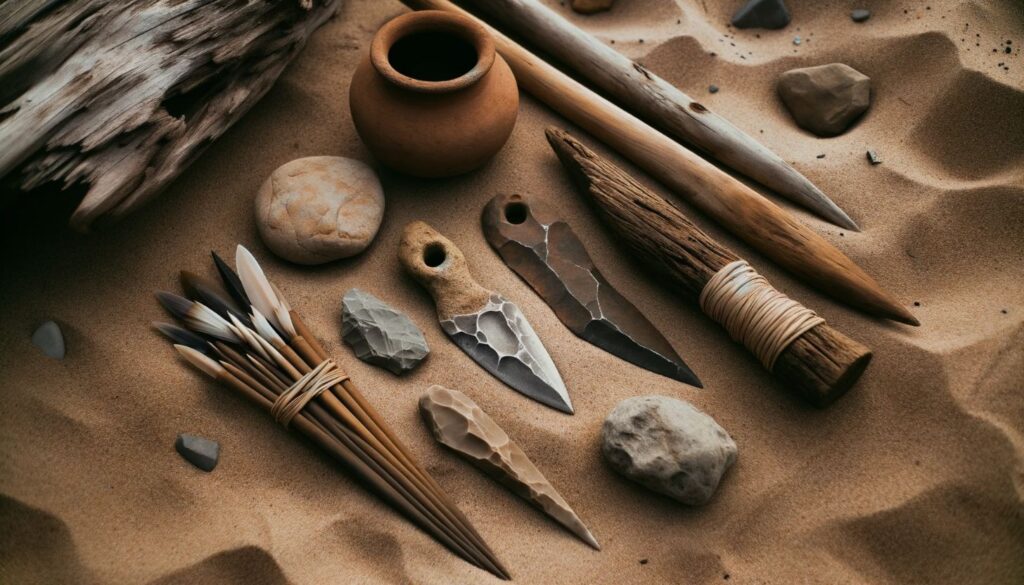
Fire Mastery: Firecraft Skills
Fire is one of the most important elements in any survival situation, providing warmth, light, and a means to cook food and purify water. Mastering firecraft skills is therefore essential for anyone seeking to survive in the wild.
There are various techniques for starting a fire, including using a fire starter or matches, friction, and magnification. Each method has its advantages and disadvantages, and it’s essential to understand the pros and cons of each before embarking on any outdoor adventure.
Learning how to manage the fire is also crucial for survival. This involves ensuring that the fire remains at a manageable level and that it doesn’t spread out of control. You can do this by building a fire pit, using fire-retardant materials, and monitoring the fire constantly.
Fire is also essential for purifying water. Boiling water for at least five minutes can kill most harmful bacteria and viruses, making it safe for drinking. You can use the fire to heat up stones and place them in a container of water to bring it to a boil.
Finally, understanding the importance of fire in different survival scenarios is essential for survival. Fire can provide a signal to rescuers, deter wildlife, and provide warmth in cold weather. Knowing how to start and maintain a fire under different conditions is key to surviving in the wild.
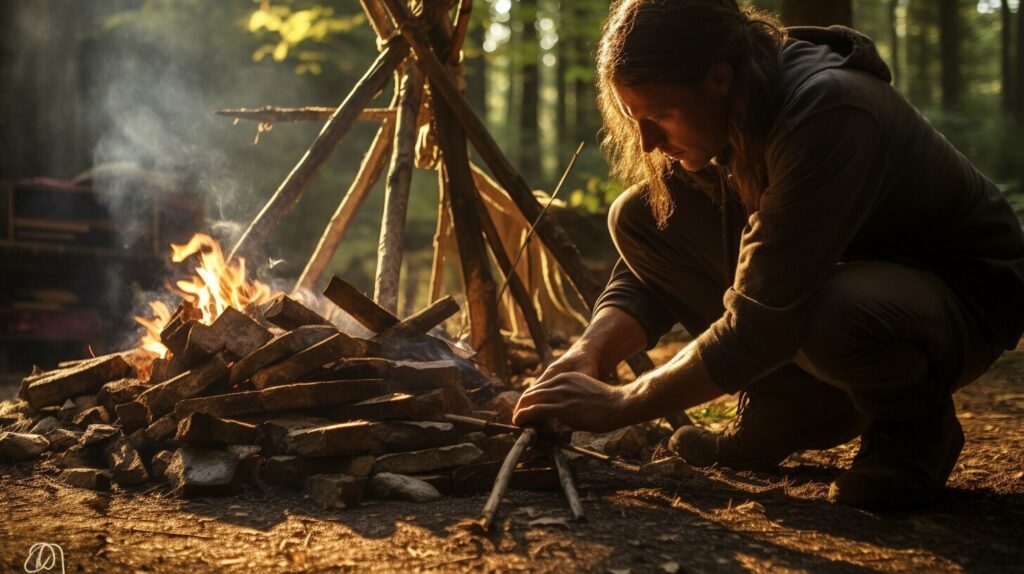
Mastering firecraft skills is an essential part of primitive technology and bushcraft skills. By building your knowledge and understanding of fire, you can enhance your chances of survival in any wilderness scenario.
Shelter-Building Techniques: Bushcraft Skills
When venturing into the wilderness, you must be prepared to protect yourself from the elements. Knowing how to build a proper shelter using natural resources is a critical bushcraft skill.
Improvised shelters can be constructed quickly and easily using materials such as branches, leaves, and moss. However, if you have more time and resources available, primitive shelters can provide more significant protection.
One popular type of primitive shelter is a debris hut. To construct a debris hut, create a frame using long branches and cover it with leaves and bark. The key to a well-built debris hut is ensuring that no gaps remain to let in drafts or rainwater.
| Pros | Cons |
|---|---|
| Quick and easy to build | Not as secure as primitive shelters |
| Requires minimal resources | May not provide adequate protection in extreme weather conditions |
| Easily transportable | May require frequent maintenance |
Primitive shelters, on the other hand, are more durable and can withstand harsh weather conditions. A lean-to is a basic type of primitive shelter, constructed using a long branch leaned against a support and covered with leaves or other materials. More complex structures, such as a longhouse, can be constructed using poles and woven mats.
Regardless of the type of shelter, always ensure that you build it in a safe location, away from potential hazards such as falling rocks or flood-prone areas.
With these shelter-building techniques, you can enhance your outdoor skills and prepare for any wilderness scenario.
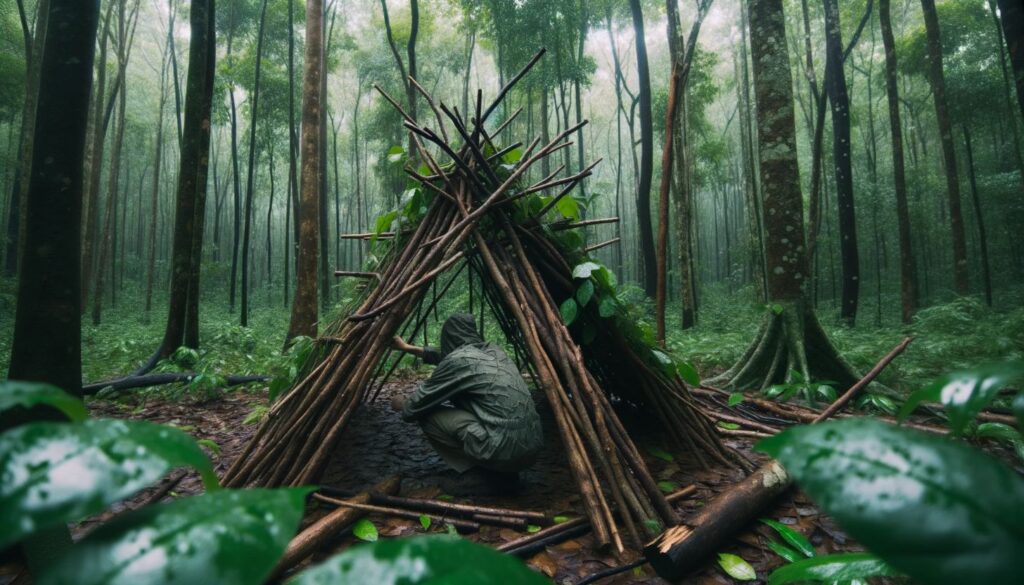
First Aid and Wilderness Medicine
When heading into the wilderness, it’s important to be prepared for any medical emergencies that may arise. Survival training includes knowledge of first aid and wilderness medicine, which can be life-saving in remote areas where medical assistance is not readily available.
The first step in wilderness medicine is to create a first aid kit that includes essential supplies such as bandages, gauze, antiseptic wipes, and pain relievers. Additionally, it’s important to bring any necessary medications, including those for chronic conditions.
Wilderness survival techniques require the ability to improvise medical supplies in the absence of traditional medical equipment. For example, spider webs and duct tape can be used as makeshift bandages, and pine resin can be used to seal cuts and puncture wounds.
It’s also important to know how to handle common wilderness injuries such as snake bites, bee stings, and burns. For example, if you are bitten by a snake, it’s important to immobilize the affected limb and seek medical attention immediately.
Finally, it’s important to understand the symptoms and treatment of potentially life-threatening conditions such as hypothermia and dehydration. By staying informed and prepared, you can ensure your safety and well-being in any wilderness scenario.
Example First Aid Kit:
| Item | Quantity |
|---|---|
| Band-aids | 10 |
| Gauze | 2 rolls |
| Adhesive tape | 1 roll |
| Antibiotic ointment | 1 tube |
| Antiseptic wipes | 10 |
| Pain relievers | 10 tablets |
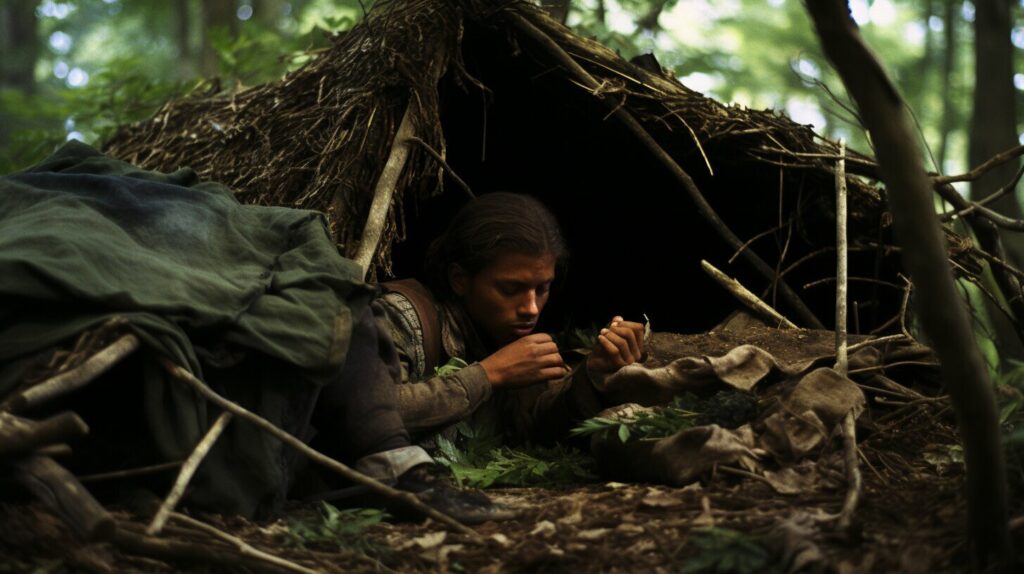
By being prepared with the necessary supplies and knowledge, you can enjoy the great outdoors with confidence and peace of mind.
Conclusion
Mastering primitive skills for survival is essential for anyone who loves to explore the great outdoors. You never know when you might find yourself in a survival situation, and being equipped with the necessary skills can mean the difference between life and death.
Start Small, Aim High
If you’re just starting, the best way to become proficient in primitive skills for survival is to start small and build your way up. Start by learning basic survival skills and then gradually progress towards more advanced techniques.
Stay Safe
Remember, safety should always be your top priority when practicing primitive skills for survival. Always inform someone of your location before venturing out into the wilderness, and be prepared with essential gear and supplies.
Enhance Your Skills
Attending survival training courses or joining a bushcraft community can also enhance your skills and knowledge. You can learn from experienced instructors and connect with other outdoor enthusiasts to practice your skills and gain new insights.
Be Prepared
Ultimately, being prepared with the right mindset, skillset, and equipment is crucial for any outdoor expedition. With the skills and knowledge gained from mastering primitive skills for survival, you can achieve self-sufficiency and adaptability to thrive in the wilderness.
FAQ
What are primitive skills for survival?
Primitive skills for survival are traditional techniques and knowledge used to live in and navigate the natural environment, such as fire-making, shelter-building, hunting, and foraging.
Why are primitive skills important for survival?
Primitive skills are important for survival because they allow individuals to be self-sufficient and adapt to wilderness situations where modern conveniences may not be available.
How do I learn primitive skills for survival?
There are various resources available to learn primitive skills, including books, online tutorials, survival schools, and practicing these skills in the outdoors.
Are primitive skills only for advanced outdoor enthusiasts?
No, primitive skills can be learned and practiced by anyone interested in outdoor adventures, from beginners to experienced outdoor enthusiasts.
Can I use primitive skills in everyday life?
Yes, many primitive skills have practical applications in everyday life, such as fire-starting techniques, basic first aid, and wilderness navigation.
Are primitive skills relevant in modern society?
While modern technology has made certain aspects of primitive skills less necessary for day-to-day life, understanding and practicing primitive skills can enhance self-reliance and provide valuable knowledge in emergency situations or wilderness expeditions.
Can I apply primitive skills in urban areas?
While some primitive skills may not be directly applicable in urban areas, the problem-solving mindset and adaptability developed through practicing primitive skills can be beneficial in various contexts.
Do I need special equipment to learn primitive skills?
While some equipment may enhance the learning process, many primitive skills can be practiced using basic tools and materials found in nature.
Are there any safety considerations when learning primitive skills?
Yes, it is important to prioritize safety when practicing primitive skills. Take precautions, start with beginner-level skills, and seek proper training and guidance.
How long does it take to master primitive skills?
The time it takes to master primitive skills varies depending on individual effort, practice, and the complexity of the skill. Consistent practice and hands-on experience are key.


